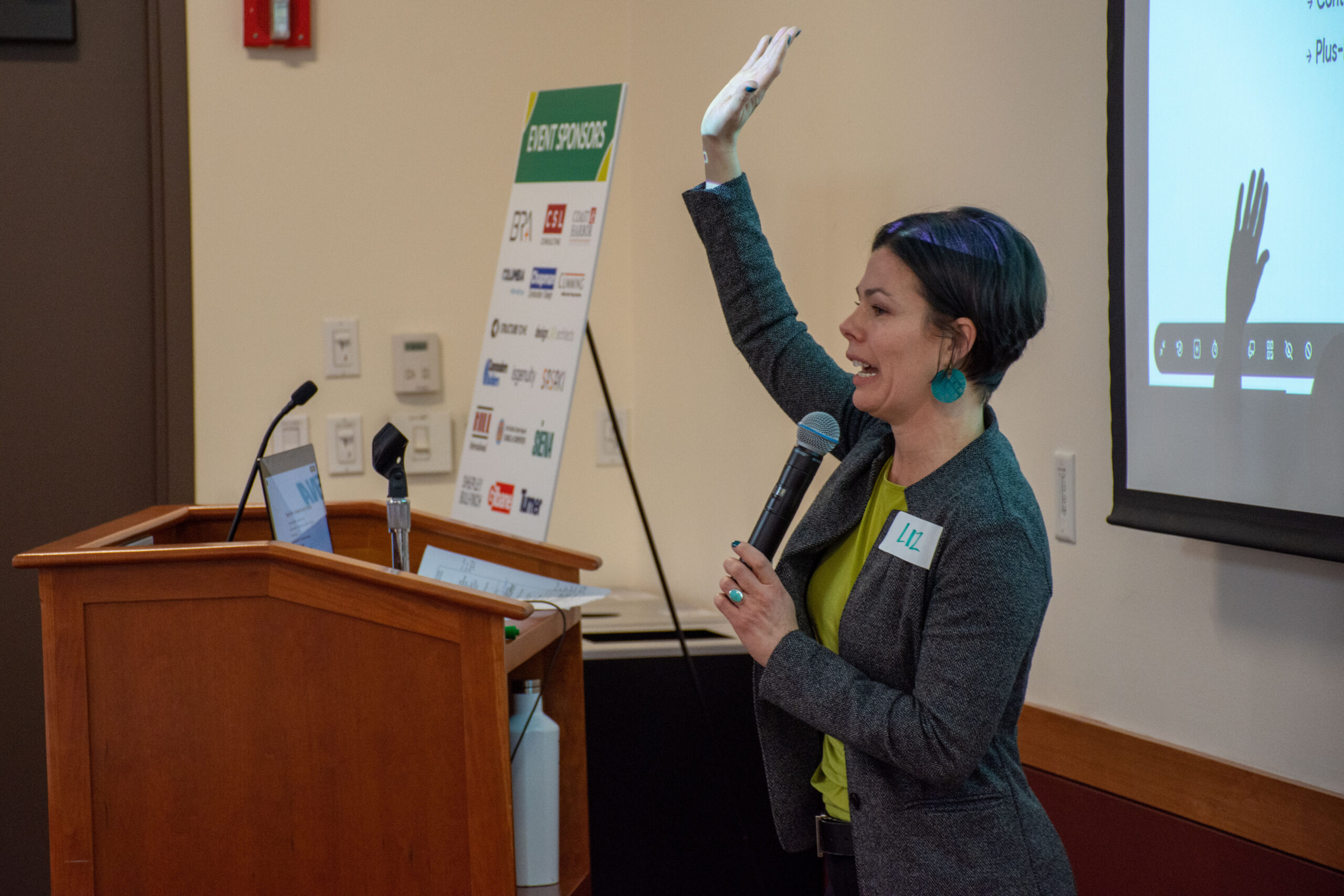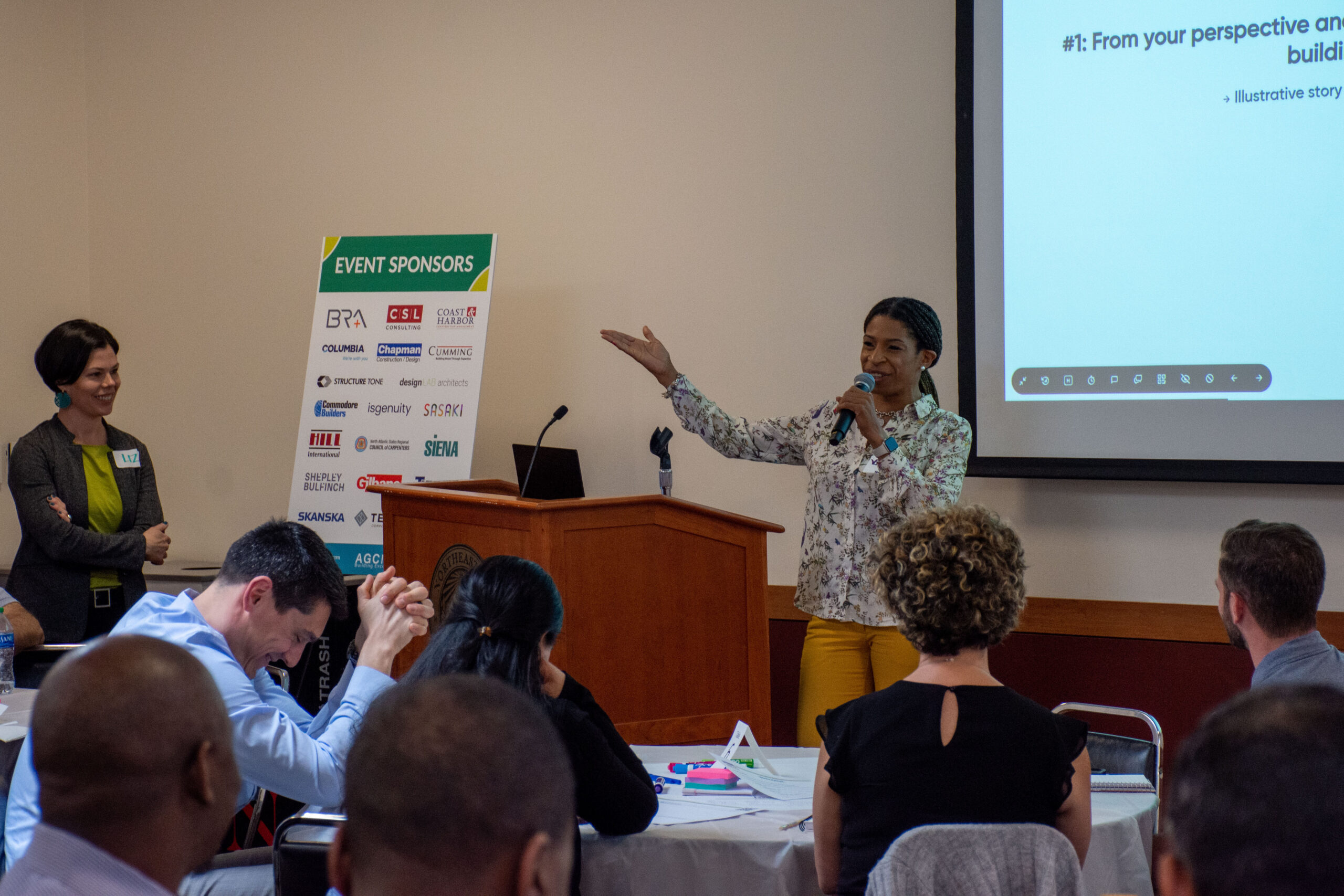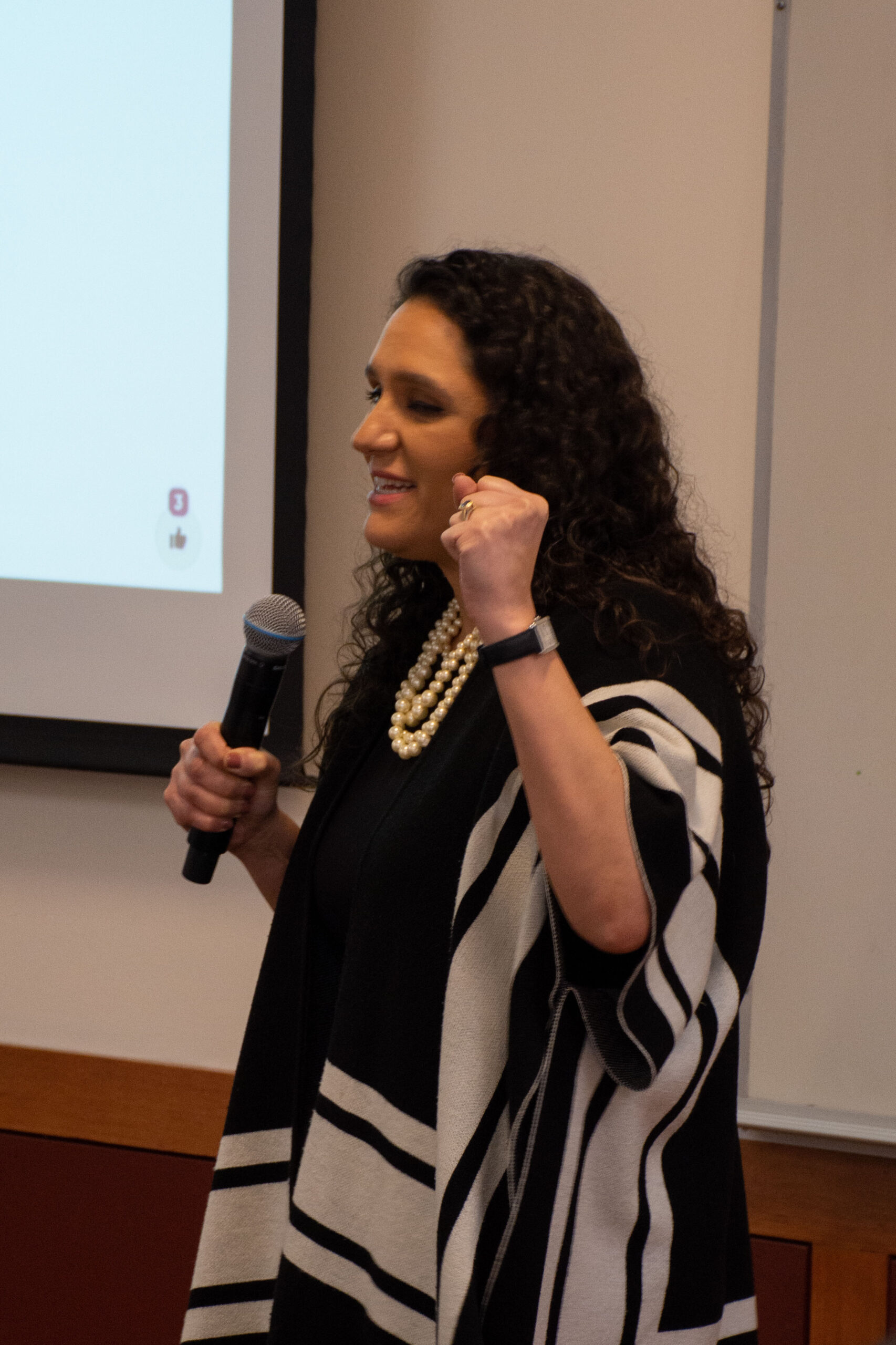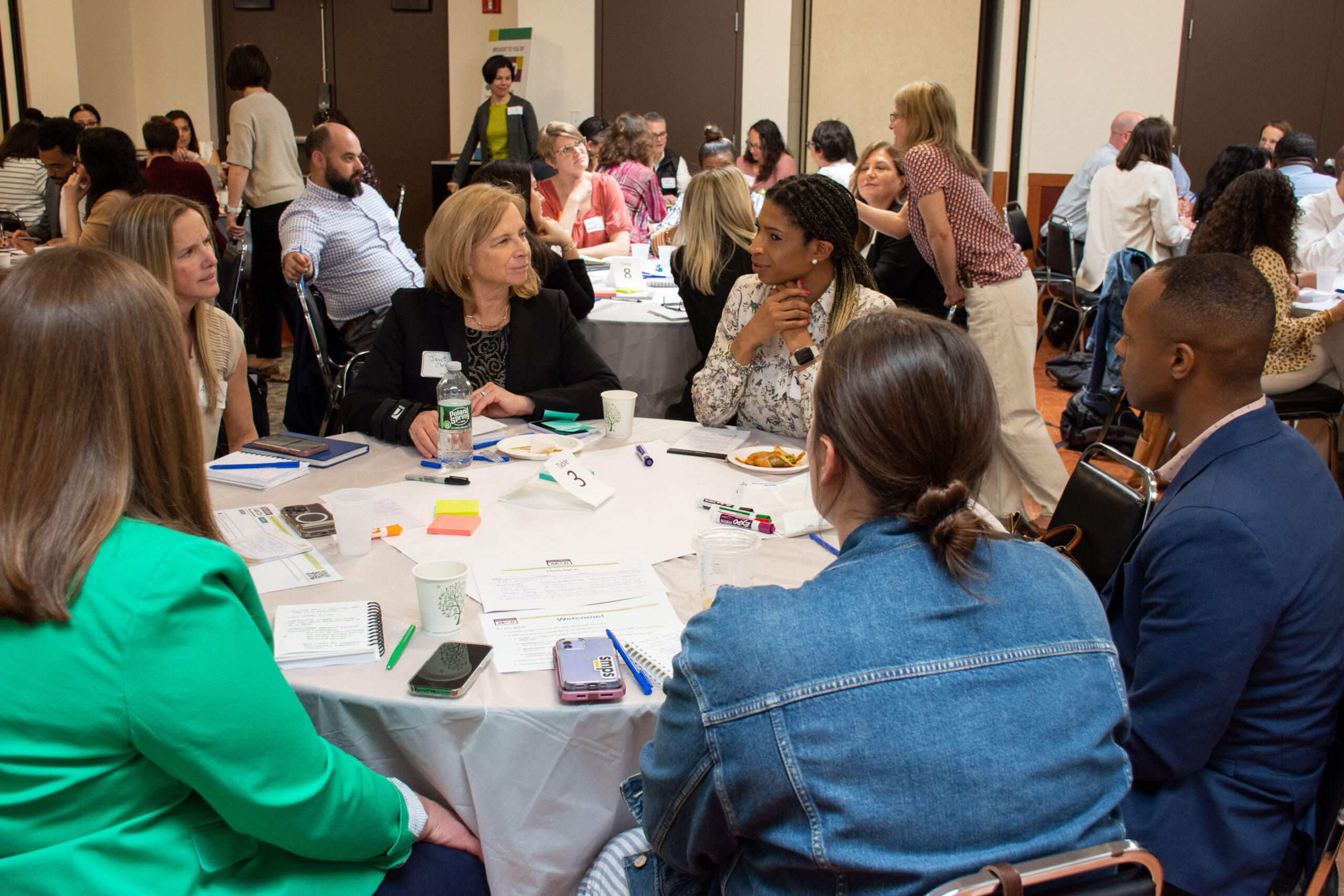A bustling crowd of more than a hundred industry professionals working in construction, architecture, and planning gathered at Northeastern University to explore the topic of diversity. The conference the Alliance for Building and Construction Diversity (ABCD), which was officially founded in March 2023. The Alliance was formed by Tim Singleton, our Assistant Vice-President of Capital Projects.
Singleton began this effort while leading the construction efforts at Wellesley College as the Associate Director of Construction, where he convened institutional owners and thought leaders together since 2019 to encourage deeper commitment to diversity and equity in the field. Now that he has joined PREF, he tapped our Diversity, Equity, Inclusion and Culture lead, Beya Jimenez to assist with formulating the agenda and prompts for the workshop session. As part of the organizational commitment to equity & inclusion, the workshop served as an opportunity to discuss ways to further our DEI efforts while engaging industry partners.
Representatives from higher education institutions, owners of large firms, consultants, engineers, architects, and more were present at the conference all eager to continue the conversations that had sparked with this group since 2019. Ai Kurokawa, an architect at Isgenuity LLC, and John Ferrante, CEO of Associated General Contractors of Massachusetts, opened the event and expressed gratitude for the support and enthusiasm for the ongoing commitment to diversity, equity and inclusion.
On the planning committee was Liz Myers of Integrative Leadership Strategies who served as the emcee for the day, along with support from Haley & Aldrich, both of whom are environmental and engineering consultants.
Groups first discussed what is not working with the industry right now. To get people thinking, Vicki Gray, founder and CEO of New Chapter Services discussed her experience as a Black woman owning a small business and competing with more established and bigger companies. One issue she brought up is communication between potential clients and service companies. She called for a clearer and more efficient scope of work to be laid out so that pricing can be more accurate. Additionally, she feels that the practice of paying small business contractors between 60 and 90 days after the project is completed was unfair to small businesses considering that many are cash-strapped and need ongoing cash flow for their payroll and operations management.
After the first session, ideas in the room really started to flow. Social capital was a common theme and seen as a key indicator of ways all can support minority and small businesses to launch ahead. As new businesses are being formed, it is difficult to compete with bigger companies that have preexisting relationships with owners. Gaining a reputation and being recognized as a competent business is the difficult part, and throughout the day, small business owners asked the owners in the room to give new and small businesses a chance. People of color and minorities face unique challenges in starting and growing a small business including lack of access to training, resources and outside burdens.
The next question had to do with increasing diversity beyond project requirements. The group discussed building pipelines and getting more young people involved with the construction industry, whether that means working with youth organizations, apprenticeship programs or volunteering at schools.
Next, the group discussed how to measure progress and diversity, both from the owner and bidder’s point of view. A number of participants shared their thoughts about how a more diverse group of people making a decision can lead to a better decision in the end. Diversity in this example includes ethnicity, lived experience, and occupation. Trades workers actually constructing and working on the building have valuable insight into decisions regarding the structure.
Sponsors for this event included Skanska construction services, Sasaki Design, Gilbane Construction company, the North Atlantic States Regional Council of Carpenters, Shepley Bulfinch Architecture firm and more.
While many in the room seemed passionate about the goals and ideas presented,they did express the ongoing challengers of bringing it to reality. Many owners spoke about the time crunch and large workload they deal with, making their diversity commitments harder to maintain.
Cynthia Tsao, who is a consultant, was excited to attend the event and hear everyone’s ideas. As a consultant specializing in team building and more effective work within companies, she has been advocating for diversity for years because diversity does in fact bring better results. During the discussion, she brought up A3 reports problem solving technique as a way of measuring diversity. She knows that it is “hard” for companies and teams to always prioritize diversity and improvement.
“Teams are under such stress to deliver quickly, so the extra stuff just falls by the wayside,” Tsao said.
“It was good to see that everyone is bringing that curiosity and that we’re collectively developing that ambition together,” Tsao said. “I think that’s what’s important.”
Kelly Meade, of Haley & Aldrich environmental and geotechnical engineering consultants, helped Liz Myers facilitate the event. She sees the construction industry as an industry that needs changing in terms of diversity, practices, using data and technology and recruiting people. This event helped inspire her and colleagues to take more action.
“You can see people yearning to have more dialogue, to share ideas, to take action together,” Meade said. “Part of the next steps is how can people in this room today stay connected, bring others in, and advance the actions that everyone has come up with.”
She feels that while people have made strides towards utilizing MWBEs, they don’t tend to find new MWBEs to use and instead only work with what they know.
In addition to sharing ideas, this event facilitated a lot of networking between owners and contractors and small business owners amongst each other. At the end of the event, attendees could join a linkedin group to continue the conversation.
Singleton is planning on continuing the workshop series with the support of our DEI & Culture leader Beya Jimenez with a deeper focus on amplifying real-work examples of diversity in action.
While company and industry diversity standards are a start, ultimately, this conference demonstrated that there is infinite room for improvement and growth. With more people thinking about ways to improve and implement diversity in their workforces, the better they will be.
Written by Renée Abbott, May 15th, 2023
Photos by Katherine Morrissey




